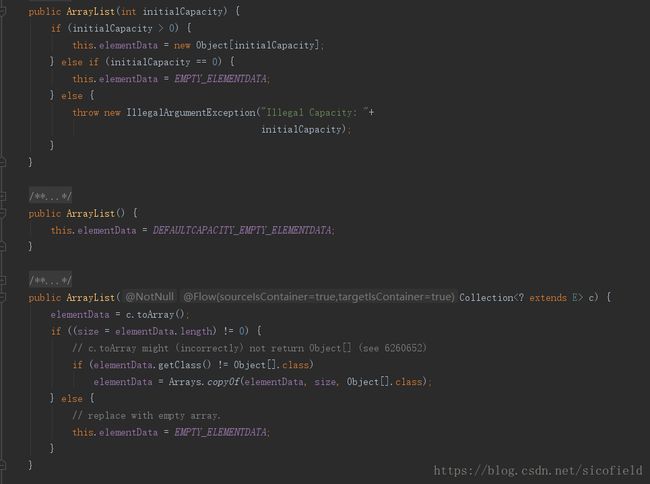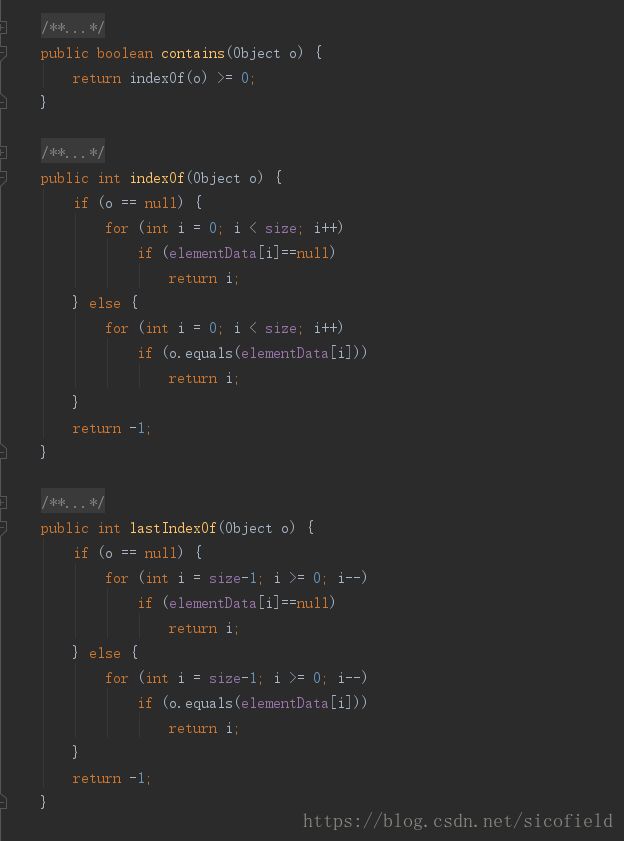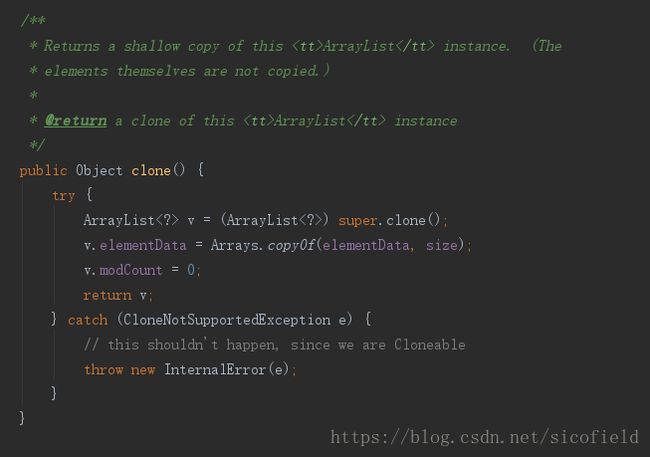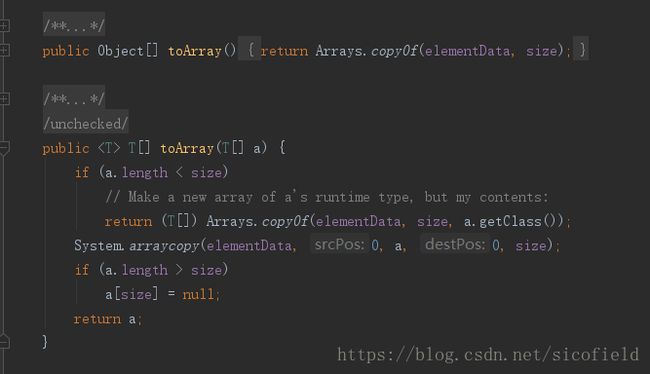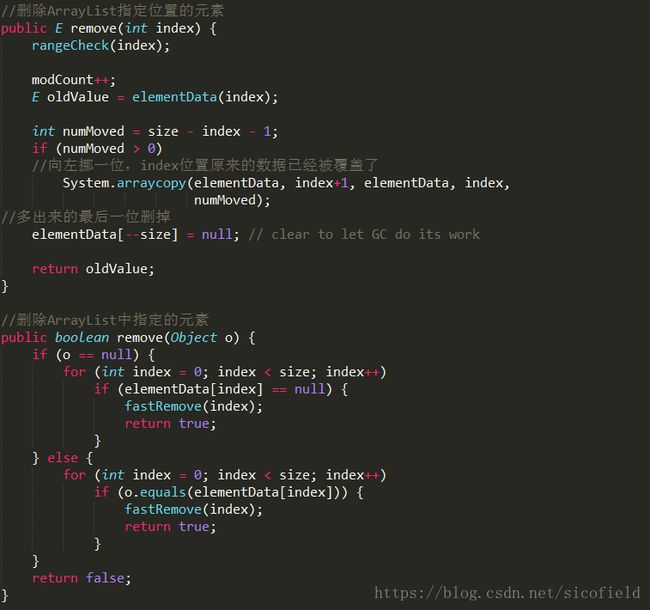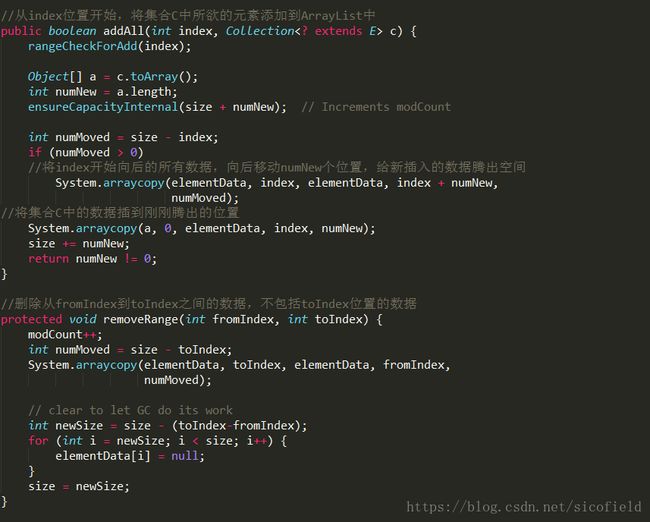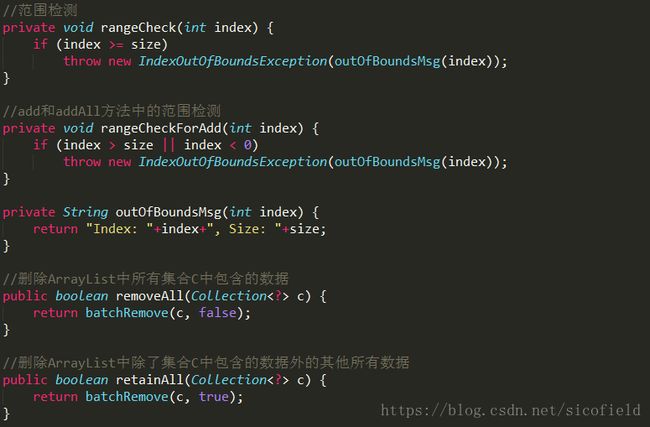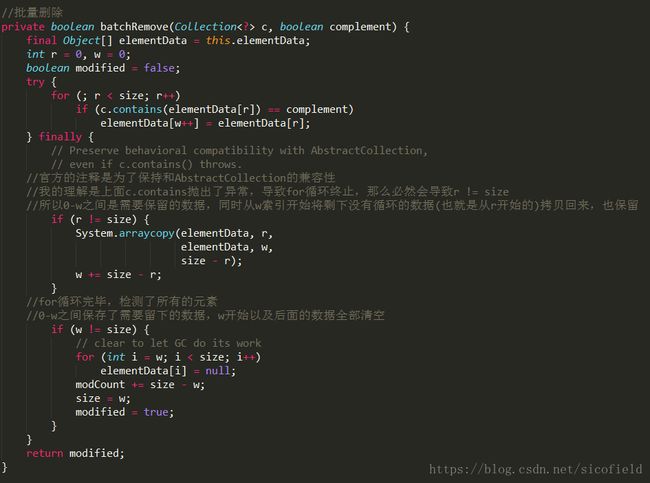Java集合框架剖析(3)——ArrayList
ArrayList
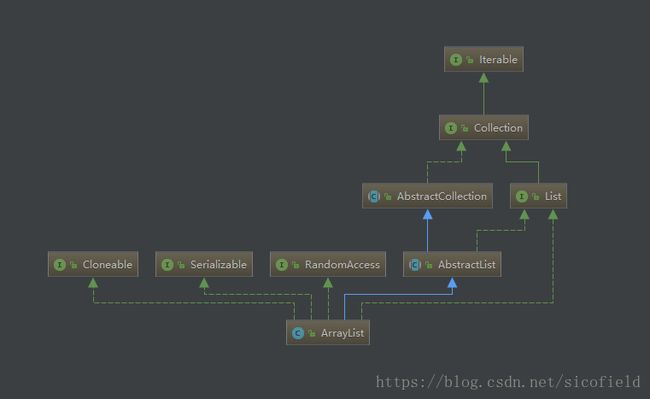
ArrayList继承了AbstractList,实现了List。它是一个数组队列,相当于动态数组。提供了相关的添加、删除、修改和遍历等功能。
ArrayList实现了RandomAccess接口,即提供了随机访问功能。RandomAccess是java中用来被List实现,为List提供快速访问功能的。在ArrayList中,我们即可以通过元素的序号来快速获取元素对象,这就是快速随机访问。下文会比较List的“快速随机访问”和使用“Iterator迭代器访问”的效率。
ArrayList实现了Cloneable接口,即覆盖了函数clone(),能被克隆。
ArrayList实现了java.io.Serializable接口,这意味着ArrayList支持序列化,能通过序列化去传输。
和Vector不同,ArrayList中的操作是非线程安全的。所以建议在单线程中使用ArrayList,在多线程中选择Vector或者CopyOnWriteArrayList。
接口总览
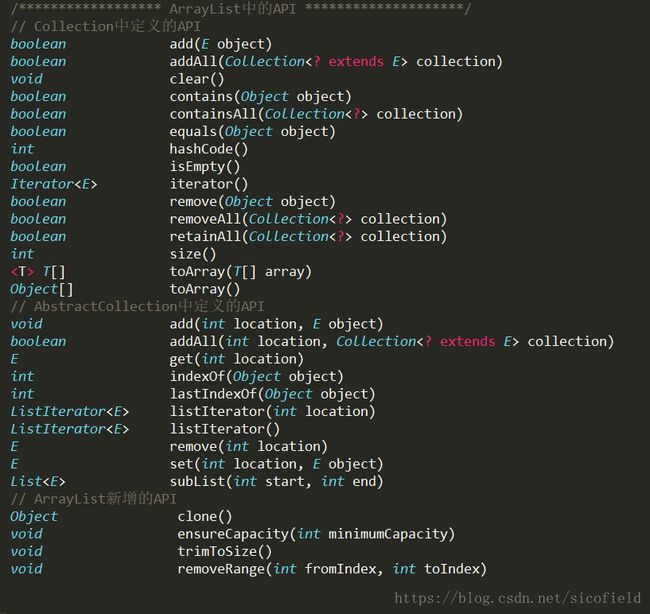
ArrayList包含了两个重要的对象:elementData和size。

elementData是Object[]类型的数组,它保存了添加到ArrayList中的元素。实际上,elementData是一个动态数组,我们能通过ArrayList(int initialCapacity)来执行它的初始容量为initialCapacity。如果通过不含参数的构造函数来创建ArrayList,则elementData是一个空数组(后面会调整其大小)。elementData数组的大小会根据ArrayList容量的增长而动态的增长。
size则是动态数组实际的大小。
源码解析
属性
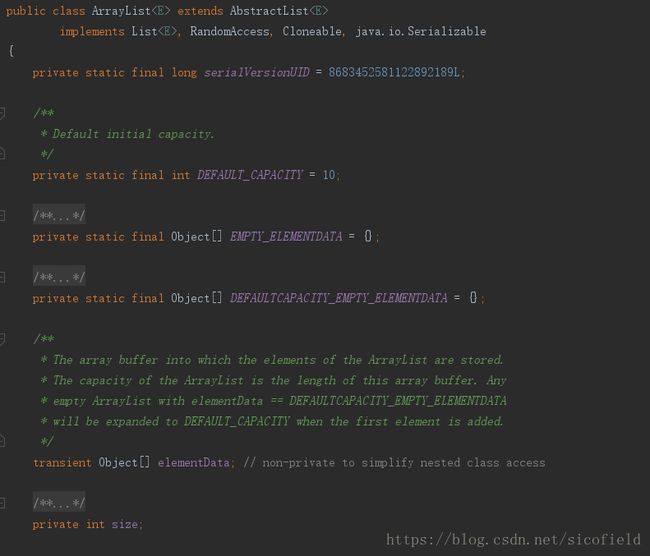
看transient Object[] elementData 的注释,当一个空的ArrayList加入第一个元素的时候就会将容量扩充到10(DEFAULT_CAPACITY)
构造函数
容量相关

public的接口可以提供给外部调用

当然还有两个内部private的接口用于扩充容量

另外要提一下的是ArrayList是有最大长度的,超过这个长度就会有OutOfMemory的Exception
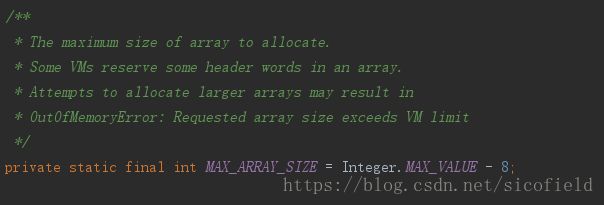
搜索相关
clone
toArray
位置操作
迭代器
(这边需要重写)
/******************************** Iterators ************************************/
/**
* 该部分的方法重写了AbstractList抽象类中Iterator部分的方法,因为ArrayList继承
* 了AbstractList,基本大同小异,只是这里针对本类的数组,思想与AbstractList一致
* 可以参照上一章Collection架构与源码分析的AbatractList部分
*/
public ListIterator listIterator(int index) {
if (index < 0 || index > size)
throw new IndexOutOfBoundsException("Index: "+index);
return new ListItr(index);
}
public ListIterator listIterator() {
return new ListItr(0);
}
public Iterator iterator() {
return new Itr();
}
private class Itr implements Iterator<E> {
int cursor; // index of next element to return
int lastRet = -1; // index of last element returned; -1 if no such
int expectedModCount = modCount;
public boolean hasNext() {
return cursor != size;
}
@SuppressWarnings("unchecked")
public E next() {
checkForComodification();
int i = cursor;
if (i >= size)
throw new NoSuchElementException();
Object[] elementData = ArrayList.this.elementData;
if (i >= elementData.length)
throw new ConcurrentModificationException();
cursor = i + 1;
return (E) elementData[lastRet = i];
}
public void remove() {
if (lastRet < 0)
throw new IllegalStateException();
checkForComodification();
try {
ArrayList.this.remove(lastRet);
cursor = lastRet;
lastRet = -1;
expectedModCount = modCount;
} catch (IndexOutOfBoundsException ex) {
throw new ConcurrentModificationException();
}
}
final void checkForComodification() {
if (modCount != expectedModCount)
throw new ConcurrentModificationException();
}
}
private class ListItr extends Itr implements ListIterator<E> {
ListItr(int index) {
super();
cursor = index;
}
public boolean hasPrevious() {
return cursor != 0;
}
public int nextIndex() {
return cursor;
}
public int previousIndex() {
return cursor - 1;
}
@SuppressWarnings("unchecked")
public E previous() {
checkForComodification();
int i = cursor - 1;
if (i < 0)
throw new NoSuchElementException();
Object[] elementData = ArrayList.this.elementData;
if (i >= elementData.length)
throw new ConcurrentModificationException();
cursor = i;
return (E) elementData[lastRet = i];
}
public void set(E e) {
if (lastRet < 0)
throw new IllegalStateException();
checkForComodification();
try {
ArrayList.this.set(lastRet, e);
} catch (IndexOutOfBoundsException ex) {
throw new ConcurrentModificationException();
}
}
public void add(E e) {
checkForComodification();
try {
int i = cursor;
ArrayList.this.add(i, e);
cursor = i + 1;
lastRet = -1;
expectedModCount = modCount;
} catch (IndexOutOfBoundsException ex) {
throw new ConcurrentModificationException();
}
}
}
public List subList(int fromIndex, int toIndex) {
subListRangeCheck(fromIndex, toIndex, size);
return new SubList(this, 0, fromIndex, toIndex);
}
static void subListRangeCheck(int fromIndex, int toIndex, int size) {
if (fromIndex < 0)
throw new IndexOutOfBoundsException("fromIndex = " + fromIndex);
if (toIndex > size)
throw new IndexOutOfBoundsException("toIndex = " + toIndex);
if (fromIndex > toIndex)
throw new IllegalArgumentException("fromIndex(" + fromIndex +
") > toIndex(" + toIndex + ")");
}
private class SubList extends AbstractList<E> implements RandomAccess {
private final AbstractList parent;
private final int parentOffset;
private final int offset;
int size;
SubList(AbstractList parent,
int offset, int fromIndex, int toIndex) {
this.parent = parent;
this.parentOffset = fromIndex;
this.offset = offset + fromIndex;
this.size = toIndex - fromIndex;
this.modCount = ArrayList.this.modCount;
}
public E set(int index, E e) {
rangeCheck(index);
checkForComodification();
E oldValue = ArrayList.this.elementData(offset + index);
ArrayList.this.elementData[offset + index] = e;
return oldValue;
}
public E get(int index) {
rangeCheck(index);
checkForComodification();
return ArrayList.this.elementData(offset + index);
}
public int size() {
checkForComodification();
return this.size;
}
public void add(int index, E e) {
rangeCheckForAdd(index);
checkForComodification();
parent.add(parentOffset + index, e);
this.modCount = parent.modCount;
this.size++;
}
public E remove(int index) {
rangeCheck(index);
checkForComodification();
E result = parent.remove(parentOffset + index);
this.modCount = parent.modCount;
this.size--;
return result;
}
protected void removeRange(int fromIndex, int toIndex) {
checkForComodification();
parent.removeRange(parentOffset + fromIndex,
parentOffset + toIndex);
this.modCount = parent.modCount;
this.size -= toIndex - fromIndex;
}
public boolean addAll(Collection c) {
return addAll(this.size, c);
}
public boolean addAll(int index, Collection c) {
rangeCheckForAdd(index);
int cSize = c.size();
if (cSize==0)
return false;
checkForComodification();
parent.addAll(parentOffset + index, c);
this.modCount = parent.modCount;
this.size += cSize;
return true;
}
public Iterator iterator() {
return listIterator();
}
public ListIterator listIterator(final int index) {
checkForComodification();
rangeCheckForAdd(index);
final int offset = this.offset;
return new ListIterator() {
int cursor = index;
int lastRet = -1;
int expectedModCount = ArrayList.this.modCount;
public boolean hasNext() {
return cursor != SubList.this.size;
}
@SuppressWarnings("unchecked")
public E next() {
checkForComodification();
int i = cursor;
if (i >= SubList.this.size)
throw new NoSuchElementException();
Object[] elementData = ArrayList.this.elementData;
if (offset + i >= elementData.length)
throw new ConcurrentModificationException();
cursor = i + 1;
return (E) elementData[offset + (lastRet = i)];
}
public boolean hasPrevious() {
return cursor != 0;
}
@SuppressWarnings("unchecked")
public E previous() {
checkForComodification();
int i = cursor - 1;
if (i < 0)
throw new NoSuchElementException();
Object[] elementData = ArrayList.this.elementData;
if (offset + i >= elementData.length)
throw new ConcurrentModificationException();
cursor = i;
return (E) elementData[offset + (lastRet = i)];
}
public int nextIndex() {
return cursor;
}
public int previousIndex() {
return cursor - 1;
}
public void remove() {
if (lastRet < 0)
throw new IllegalStateException();
checkForComodification();
try {
SubList.this.remove(lastRet);
cursor = lastRet;
lastRet = -1;
expectedModCount = ArrayList.this.modCount;
} catch (IndexOutOfBoundsException ex) {
throw new ConcurrentModificationException();
}
}
public void set(E e) {
if (lastRet < 0)
throw new IllegalStateException();
checkForComodification();
try {
ArrayList.this.set(offset + lastRet, e);
} catch (IndexOutOfBoundsException ex) {
throw new ConcurrentModificationException();
}
}
public void add(E e) {
checkForComodification();
try {
int i = cursor;
SubList.this.add(i, e);
cursor = i + 1;
lastRet = -1;
expectedModCount = ArrayList.this.modCount;
} catch (IndexOutOfBoundsException ex) {
throw new ConcurrentModificationException();
}
}
final void checkForComodification() {
if (expectedModCount != ArrayList.this.modCount)
throw new ConcurrentModificationException();
}
};
}
public List subList(int fromIndex, int toIndex) {
subListRangeCheck(fromIndex, toIndex, size);
return new SubList(this, offset, fromIndex, toIndex);
}
private void rangeCheck(int index) {
if (index < 0 || index >= this.size)
throw new IndexOutOfBoundsException(outOfBoundsMsg(index));
}
private void rangeCheckForAdd(int index) {
if (index < 0 || index > this.size)
throw new IndexOutOfBoundsException(outOfBoundsMsg(index));
}
private String outOfBoundsMsg(int index) {
return "Index: "+index+", Size: "+this.size;
}
private void checkForComodification() {
if (ArrayList.this.modCount != this.modCount)
throw new ConcurrentModificationException();
}
}
} 总结
- ArrayList实际上是通过一个数组去保存数据的,当我们构造ArrayList时,如果使用默认构造函数,最后ArrayList的默认容量大小是10。
- 当ArrayList容量不足以容纳全部元素时,ArrayList会自动扩张容量,新的容量 = 原始容量 + 原始容量 / 2。
- ArrayList的克隆函数,即是将全部元素克隆到一个数组中。
- ArrayList实现java.io.Serializable的方式。当写入到输出流时,先写入“容量”,再依次写出“每一个元素”;当读出输入流时,先读取“容量”,再依次读取“每一个元素”。
ArrayList遍历方式
ArrayList支持三种遍历方式
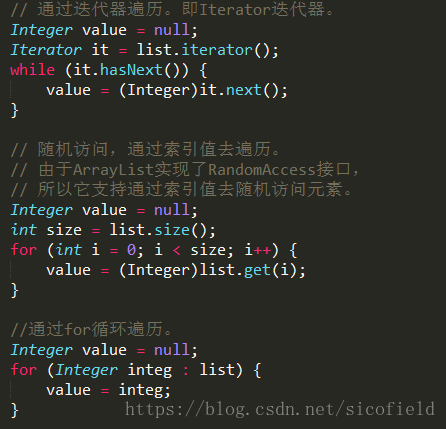
猜猜哪个效率最高!!
其实应该是随机访问效率最高, 因为ArrayList内部的存储就是个数组,直接用内存地址偏移寻址肯定要比迭代器快。
可以做个试验:
import java.util.*;
/*
* @description ArrayList三种遍历方式效率的测试
* @author eson_15
*/
public class ArrayListRandomAccessTest {
public static void main(String[] args) {
List list = new ArrayList();
for (int i=0; i<500000; i++)
list.add(i);
isRandomAccessSupported(list);//判断是否支持RandomAccess
iteratorThroughRandomAccess(list) ;
iteratorThroughIterator(list) ;
iteratorThroughFor(list) ;
}
private static void isRandomAccessSupported(List list) {
if (list instanceof RandomAccess) {
System.out.println("RandomAccess implemented!");
} else {
System.out.println("RandomAccess not implemented!");
}
}
public static void iteratorThroughRandomAccess(List list) {
long startTime;
long endTime;
startTime = System.currentTimeMillis();
for (int i=0; iget(i);
}
endTime = System.currentTimeMillis();
long interval = endTime - startTime;
System.out.println("RandomAccess遍历时间:" + interval+" ms");
}
public static void iteratorThroughIterator(List list) {
long startTime;
long endTime;
startTime = System.currentTimeMillis();
for(Iterator it = list.iterator(); it.hasNext(); ) {
it.next();
}
endTime = System.currentTimeMillis();
long interval = endTime - startTime;
System.out.println("Iterator遍历时间:" + interval+" ms");
}
@SuppressWarnings("unused")
public static void iteratorThroughFor(List list) {
long startTime;
long endTime;
startTime = System.currentTimeMillis();
for(Object obj : list)
;
endTime = System.currentTimeMillis();
long interval = endTime - startTime;
System.out.println("For循环遍历时间:" + interval+" ms");
}
} 测试结果(多次平均值):
| RandomAccess(ms) | Iterator(ms) | For(ms) |
|---|---|---|
| 4.9 | 7.1 | 7.4 |
